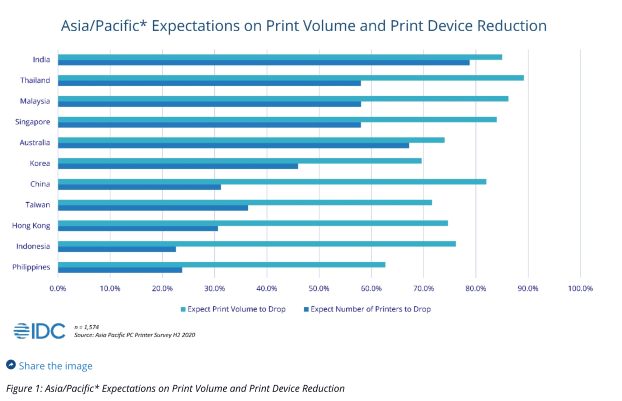The latest IDC report explains that accelerated
document process transformation will decrease the print volumes of 78.4% of
Asia/Pacific organisations
The increased shift to hybrid work, coupled with
digitalisation initiatives, has caused organisations to re-think their reliance
on paper documents and printers while finding solutions that enable mobility,
security, accessibility, and business resilience.
According to IDC’s Survey Presentation Accelerated
versus Gradual Transformers in APeJ (Asia Pacific excluding Japan), over 75% of
organisations expect printed page volume to decrease over the next two years.
Coupled with close to half of all organisations (47.7%) expecting a reduction
in print devices, these trends suggest rapid maturity and adoption of document
solutions as the region looks to digitize paper processes.

Countries were divided into Accelerated or Gradual
Transformers, depending on responses relating to likelihood of going completely
paperless, timeline for WorkSpace transformation, and degree to which they say
print volume and print devices decreasing over the next two years. Accelerated
Transformers include India, Thailand Malaysia, Singapore, Australia, and Korea,
while Gradual Transformers include China, Taiwan, Hong Kong, Indonesia, and the
Philippines.
“Both groups will transform the WorkSpace to address
a hybrid workforce, increasing the accessibility of print services through
solutions or feature upgrades to enable work from anywhere,” said Kenneth Tham,
Senior Market Analyst for Imaging, Print and Document Solutions at IDC
Asia/Pacific.
According to IDC, India, Thailand, and Malaysia
respondents indicated they would see print volumes and devices decrease to a
larger degree than digitally mature countries like Australia and Korea. This
suggests their short-term investments into document solutions will be focused
on transforming business process while nearly eliminating the need for paper.
On the other hand, Taiwan and Hong Kong were classified as Gradual Transformer
despite being digitally mature countries – it resonates the legislative value
printed documents still hold in these countries. Their document transformation
initiatives will address the co-existence of paper and digital documents,
ensuring data from all sources is captured and fed into core business systems.